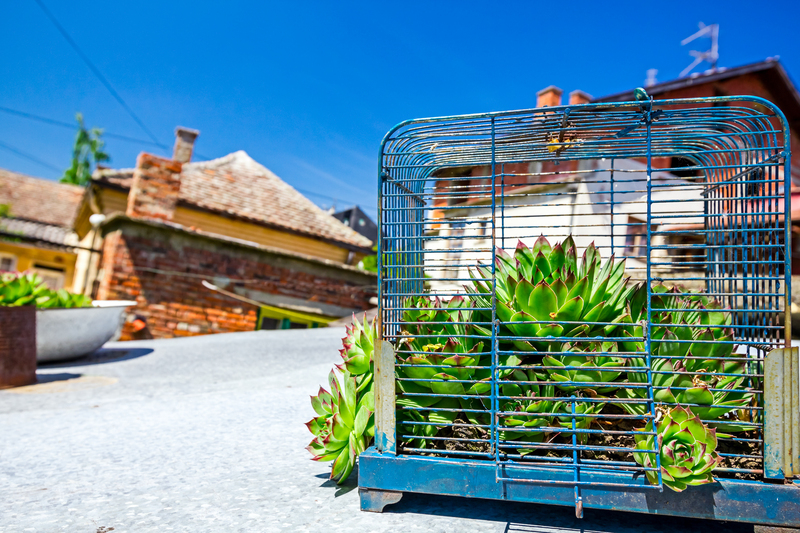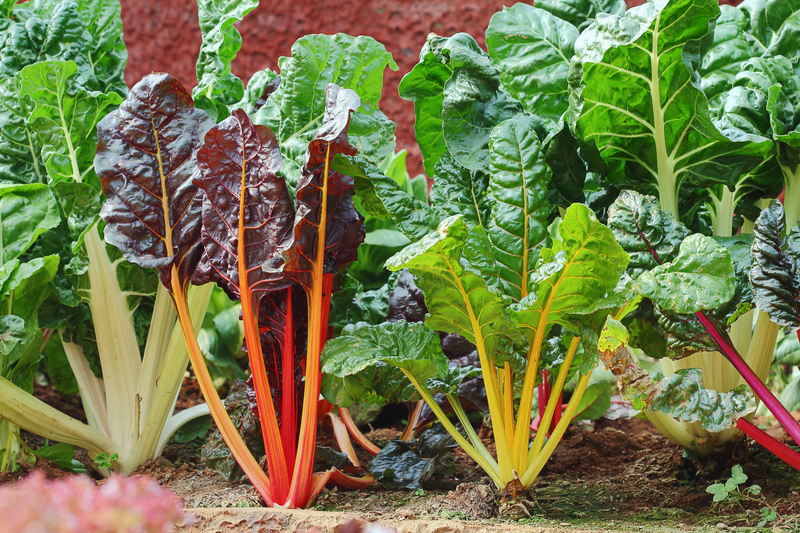Win the Battle Against Weeds with These 3 Tips
Posted on 23/06/2025
Win the Battle Against Weeds with These 3 Tips
Every gardener and homeowner knows the frustration: you spend hours tending your garden, and just when things are looking perfect, weeds seem to sprout overnight. Whether it's a lush lawn or a vibrant flowerbed, pesky weeds threaten to choke out your hard work, stealing water, nutrients, and sunlight. Fortunately, there are effective ways to win the battle against weeds. In this comprehensive guide, you'll discover the top three proven weed control tips for lawns, gardens, and flowerbeds, ensuring you maintain the healthiest, most beautiful landscape year-round.

Why Is Weed Control So Important?
Before diving into the tips, it's helpful to understand why tackling weeds matters. Weeds compete directly with your plants for essential resources. They can also harbor pests and diseases, further compromising your garden's health. Ultimately, uncontrolled weed growth can ruin curb appeal and reduce your yield if you're growing fruits or vegetables. Practicing effective weed management is a must for every gardener interested in thriving, low-maintenance outdoor spaces.
Three Essential Tips to Defeat Weeds for Good
Ready to take charge of your landscape? Here are the three most effective strategies for long-term weed control.
Tip 1: Mulching - Your Best Friend Against Weeds
Mulch isn't just an attractive addition to your garden beds - it's a formidable weapon in the fight against weeds. How does mulching help weed control?- Blocks Sunlight: Most weed seeds require light to germinate. Thick layers of mulch (2-4 inches) prevent sunlight from reaching the soil, inhibiting weed growth.
- Maintains Soil Moisture: While keeping weeds at bay, mulch helps the soil stay moist and cool, which is essential for healthy plant roots.
- Adds Organic Matter: Over time, organic mulch breaks down and enriches your soil, providing long-term benefits for your garden.
Types of Mulch for Maximum Weed Suppression:
- Bark or Wood Chips: Ideal for flower beds and around shrubs.
- Straw: Great for vegetable gardens.
- Pine Needles: Suitable for acid-loving plants.
- Compost: Both suppresses weeds and improves soil quality.
- Landscape Fabric: Lay landscape fabric beneath mulch for even better weed control.
Pro Tip: Before laying mulch, remove existing weeds and water the soil. Maintain the recommended thickness - too little won't block weeds, and too much can suffocate plant roots.
Tip 2: Proper Lawn Care - Outsmart Weeds Naturally
A thick, healthy lawn is nature's best defense against weeds. Here's how to outcompete weeds with smart lawn management:
- Mowing: Set your mower blade at the optimal height (generally 2.5-3 inches for most grasses). Taller grass shades the soil, making it harder for weed seeds to germinate and grow.
- Water Deeply and Infrequently: Watering deeply encourages grass roots to grow deeper, strengthening your turf and making it less vulnerable to drought and weed invasion.
- Fertilize Properly: Apply the right type and amount of fertilizer for your grass species at the recommended times. Under- or over-fertilizing can stress your lawn and give weeds an opportunity to take over.
- Overseed Bare Spots: Weeds love to take root in open patches. In the fall or spring, overseed bare areas to ensure a uniform, dense lawn.
Weed Control Tips for Lawns:
- Avoid Scalping: Cutting grass too short weakens turf and exposes soil, inviting weeds.
- Core Aeration: Aerate your lawn annually to relieve soil compaction, which helps grass outcompete weeds.
- Dethatch When Needed: Excess thatch provides a breeding ground for weed seeds. detatch as necessary to boost lawn health.
Lawn tip: Choose grass varieties suited to your region and specific sun/shade conditions for best weed resistance.
Tip 3: Timely and Targeted Weed Removal
No matter how well you mulch or care for your lawn, some weeds will inevitably appear. Getting rid of them quickly and efficiently is key to long-term weed control. Here's how:
- Pull Weeds Promptly: Young weeds are easier to remove, and pulling before they set seed prevents new generations from sprouting.
- Use the Right Tools: Invest in a quality hand weeder or hoe. For deep-rooted weeds (like dandelions), get the entire root to prevent regrowth.
- Weed When the Soil is Wet: Moist soil makes it easier to pull weeds out by the root; try after a rain or thorough watering.
- Spot-Treat With Herbicides: If you have a severe infestation, use selective herbicides to target only the weeds without harming your desired plants. Always follow label directions and choose products safe for your landscape.
Important: Never let weeds go to seed. Some, like crabgrass or purslane, produce thousands of seeds per plant that can lie dormant for years. Consistent attention will significantly reduce your weed seed bank over time.
Bonus: Natural and Organic Methods to Fight Weeds
For gardeners interested in eco-friendly weed management, there are several natural options that help defeat weeds without synthetic chemicals:
- Smother Weeds With Cardboard: Lay down sheets of cardboard (with overlaps) and cover with mulch to deprive weeds of light.
- Boiling Water: Pouring boiling water directly onto weeds works for driveways and paths - just be careful near prized plants.
- Vinegar Sprays: Household vinegar can kill young, tender weeds. Mix with a small amount of dish soap and spray on targeted weeds on a sunny day.
- Corn Gluten Meal: This natural pre-emergent herbicide inhibits weed seed germination in lawns, but timing of application is crucial for effectiveness.
Note: Organic methods work best as part of an integrated approach and often require persistence for best results.
Common Weeds and How to Identify Them
Being able to recognize common weed species helps you select the best removal strategy. Some of the most frequent garden invaders include:
- Dandelions: Recognizable by their yellow flowers and deep taproots.
- Crabgrass: Annual grass weed that thrives in thin or bare spots in lawns.
- Chickweed and Clover: Low-growing weeds with small leaves and white flowers.
- Bindweed: Twining vine with arrow-shaped leaves; notorious for rapid spreading.
- Purslane: Succulent weed with reddish stems; loves sunny, disturbed soil.
Tip: Use plant identification apps or seek advice from local extension offices to accurately identify weeds and prevent confusing them with desirable plants.

Frequently Asked Questions about Weed Control
Are chemical herbicides safe for my garden and pets?
Many modern herbicides are designed to target specific weed types without harming grass or flowers. However, organic and physical methods are always safest for children and pets. Always read and follow label instructions, and keep pets off treated areas until products have dried or as recommended.
When is the best time to weed my garden?
The ideal time to remove weeds is when they're young and before they flower or set seed. Early spring, after rain or watering, is usually perfect. Frequent checks (at least once a week) are recommended during peak growing season.
Can I use weed barriers for long-term control?
Weed barriers such as landscape fabric, cardboard, or biodegradable mats can offer season-long weed protection in flower beds and around trees. Be sure to install and maintain them properly to prevent weeds from growing through or around the edges.
Conclusion: Stay Ahead in Your Battle Against Weeds
Winning the fight against weeds in your garden or lawn is absolutely possible with the right approach. Remember:
- Mulch smartly to suppress new growth and enrich your soil.
- Maintain a thick, healthy lawn to crowd out weed invaders.
- Remove weeds quickly and thoroughly before they can multiply.
Combine these core strategies with natural tactics and timely intervention for a landscape that's not just weed-free but also vibrant and healthy. With diligence, the right methods, and a keen eye, you can defeat weeds naturally and enjoy your outdoor spaces to the fullest. Happy gardening!
More Tips for a Weed-Free Yard
- Rotate crops in vegetable gardens to disrupt weed life cycles.
- Regularly inspect and edge driveways, patios, and walkways.
- Install weed-free compost and soil to prevent introducing new weeds.
For ongoing success, remember: consistency matters. Stay proactive and make weed management a routine part of your garden care. Soon, you'll see the difference in a lush, beautiful, and resilient landscape - a space where weeds just can't win.
Latest Posts
Minimal Effort, Maximum Impact: 5 Budget Garden Hacks
Eliminating Carbon Footprints Through Gardening
Your Pathway to Year-Round Freshness with Herb Growing

